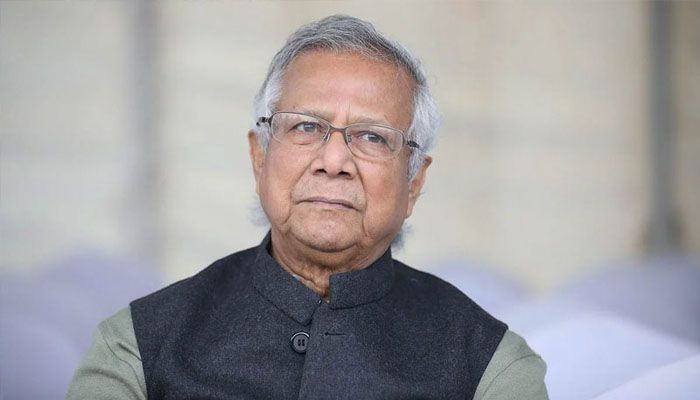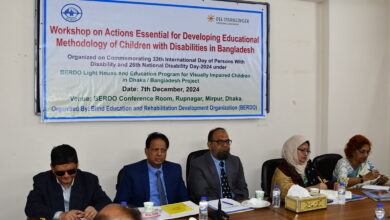BANGLADESH
Dr Yunus Issues Clarification Responding to Allegations Brought against Him

Nobel Laureate Prof Dr Muhammad Yunus on Wednesday issued a statement clarifying his position regarding some allegations made against him recently.
Yunus Centre shared the clarification with the media in a statement. It said:
Allegation:
Grameen Bank is one of the banks whose MD was Dr Yunus. Legally, he could remain MD till the age of 60. However, he remained MD illegally until he was 70-71 years old. Naturally, Bangladesh Bank gave him notice without meaning any insult to him. Our former finance minister Muhith Saheb and adviser Gowher Rizvi Saheb suggested to him that you become an advisor to Grameen Bank. We will honour you as Emeritus Advisor. But he wanted desperately wanted to remain MD. Now, as an MD of the bank, he has to take GO (permission from government) when he goes out, but he never took the GO On the contrary, we had given him many more opportunities.
Yunus’s response:
The first thing to clarify is that Grameen Bank is such a bank that is owned (75%) by its borrowers. Grameen Bank was established by incorporating some unique features through a separate law, which makes it different from other public and private banks. The managing director of Grameen Bank is appointed under a contract with conditions set by the board. There was no age limit mentioned for this appointment in the law or in the decision of the board of directors.
When Prof Yunus reached 60 years of age, he voluntarily reported to the board that the board may consider appointing a new managing director since he has reached 60 years of age. The board wanted him to continue until it decides otherwise. Board reappointed Prof Yunus when his current term was over. He was 61 years and six months old at that time. Grameen Bank explained the matter to Bangladesh Bank in one of its regular inspection reports given by Bangladesh Bank. As a result, no further observation was made in the next report of Bangladesh Bank.
Speaking of GO, he never had to take GO for traveling abroad because he was not a government employee. The government never raised any objection in this regard.
When this issue was raised in 2011 and Prof Yunus was asked to step down from his position of managing director it threatened the fundamentals of the legal status of the bank which Prof Yunus built with the support from successive governments run by all major parties.
Prof Yunus wanted to get the legal status upheld by the High Court. In order to get the legal vetting, he submitted a writ petition to the high court. It was not about his desperation to protect his job as managing director, which the prime minister repeatedly mentions as the cause of Yunus becoming hostile to her.
It was about the threat to the legal status of the bank that Prof Yunus was concerned about. Because he always believed that this legal space, he had created with the support from all previous governments is fundamental to the success of Grameen Bank as an effective tool to fight poverty.
As for his job, he offered to resign several times before, once when he reached 60 years. The Grameen Bank board wanted him to continue.
In 2010, Prof Yunus had already written to the finance minister AMA Muhith to start the process of succession by looking for a successor managing director since time had come for him to leave the position of the managing director.
That letter was published at that time in all newspapers when the prime minister accused him for holding on to his position of managing director of a bank.
It is to be noted that Prof Yunus exceeded 60 years of age during the first tenure of the Awami League Government in 2001. But the government never raised the issue of Prof Yunus’s age at that time. Bangladesh Bank also never raised the issue at any later time.
Prof Yunus wanted to get the legal status upheld by the High court. He submitted a writ petition to the high court. It was not about keeping his job as managing director.
The court refused to accept the petition for hearing on the ground that Prof Yunus did not have “Locus Standi”, which means he was not eligible to submit the petition. He appealed to the Appellate Division but his appeal was refused on the same ground.
Prof Yunus decided to resign from the position of managing director of Grameen Bank on May 12, 2011.
Allegation:
When the dismissal order from Bangladesh Bank came, Prof Yunus filed a case against Bangladesh Bank and our government. But he lost every case because the law could not cover him, the law could not reduce his age. The court could not reduce his age.
He lost and became angrier. He said: “I made Hillary Clinton call me; Tony Blair’s wife Cherie Blair called me; then one representative for the French President came; everyone (said) Yunus must remain MD. Honorable Speaker, I ask the nation, what was the attraction of the MD position of a bank that I would not have worked without it?”
He received the Nobel Prize. So, he asked why the Nobel Prize winner is so greedy for the post of MD? I think everyone should think about that. And for the World Bank to stop the money, sending repeated emails, meeting Hillary, sending emails again in between this one of our editors was very well involved with him. So, the thing is, is there any patriotism in them?
Yunus’s response:
The removal of Prof Yunus from Grameen Bank was a global news, not because Prof Yunus wanted to hold on to his post of managing director, but because it was so unbelievable to the large community of admirers and followers of Grameen philosophy and action programs around the world. They were very puzzled by this action and expressed their concerns in various ways. They were not trying to help Prof Yunus get back his job, they wanted to see that the Grameen programs continue without interruption. It only showed how much Grameen was viewed by many as a hope for the poor.
The global shock created by the removal of Prof Yunus from the position of managing director of Grameen Bank is an independent story unfolding at the same time when the World Bank was warning to stop Padma Bridge funding because of corruption.
Mixing these two independent stories into one story took it to a different path. The honourable prime minister is saying that the World Bank money was stopped because Prof Yunus was desperate to have his job back and that he conspired with Hillary Clinton to put pressure on the World Bank.
Prof Yunus made a clear statement when it was mentioned for the first time that Prof Yunus brought pressure on the World Bank to stop the Padma Bridge funding. He emphatically said that Padma Bridge has been a long-time dream of all the people of Bangladesh, including himself. There is no question of his opposing the realisation of this dream.
“The people of the country are overjoyed with the completion of the Padma Bridge today. I congratulate the prime minister and all the people of the country for this historic achievement,” said Prof Yunus.
This story propagates that Prof Yunus used his “enormous influence” to stop the financing for Padma Bridge because he was holding a grudge against the prime minister, that maybe Prof Yunus did not pressurize the World Bank directly, but he did so through his friend Hillary Clinton.
In other words, he must have some sort of connection with World Bank’s cancellation of the agreement. PM also mentions that one editor of a famous newspaper went all the way to meet the President of the World Bank to persuade him to stop the financing. The tough world of international decision-making does not depend on the whims of two friends or the visit of a newspaper editor. However ‘important’ a person Professor Yunus may be, whatever number of ‘influential friends’ he may have, a three-billion dollar project cannot be stopped just because he allegedly wants it cancelled.
In response to the allegations, it has to be said again that Prof Yunus has never made any complaint to the World Bank or any other organization or individual about the Padma Bridge. So the matter is purely imaginary.
Allegation:
Despite so many opportunities given to him, he takes 47% interest from poor people
Yunus’s response:
This comment is not correct at all. Grameen Bank’s interest on business loans has always been 20%, which is a declining simple interest.
This rate was never increased on any occasion. It should be mentioned here that the highest interest rate of microfinance allowed by the Microcredit Regulatory Authority is 27%. Grameen Bank has always disbursed its loans at rates lower than the rate determined by the government. Interest rates of Grameen loans other than business loans are much lower.
Grameen charges 8% interest on house building loans, 0% interest on education loans for borrowers’ children during their studies and 5% after completion of studies, and 0% interest on loans to the destitute. The interest rate was never 47% in Grameen Bank and not even today.
Besides, profit on the interest income of any bank is shared with its owners. Ownership of Grameen Bank rests 25% with government and 75% with the bank’s poor members. That is why both government and members receive their respective profits on a regular basis. Prof Yunus does not own a single share with the bank. So he had no opportunity to deceive anybody by charging 47% interest!
The same microcredit policy is being followed even after the removal of Prof Yunus from Grameen Bank, thus the allegation is baseless.
Allegation:
He has eaten all the money from the Grameen Bank. Otherwise, how can a managing director of a bank own so much money? How could he invest so much at home and abroad?
Yunus’s response:
Prof Yunus has not “eaten” Grameen Bank’s money. Beyond his salary package as MD of Grameen Bank, he has not received any money from Grameen Bank. He never took any money for international travel .





